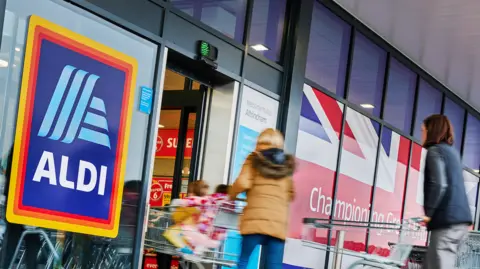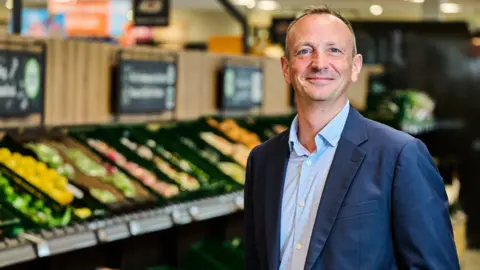Emma SimpsonBusiness correspondent
 Aldi
AldiThe boss of Aldi has warned that any measures in the Budget that further increase costs on employers could lead to higher food prices.
Giles Hurley, chief executive of Aldi UK, said the impact of last year’s National Insurance rise and the cost of new packaging rules had already “rippled through to prices on the shelf edge” across the supermarket sector.
“Any policies which affect the operating costs of business should be considered very, very carefully because of the very real risk they find their way… back into the food system and onto prices,” Mr Hurley told the BBC.
More than 60 retailers wrote to Chancellor Rachel Reeves last month, urging her to avoid further taxes on the industry, which has been among the hardest hit by the government’s revenue-raising measures.
Mr Hurley was speaking as Aldi reported that annual sales edged up to £18.1bn but profits dropped by more than a fifth to £435.5m.
It said this was the largely down to investment in price cuts, infrastructure and higher pay.
Aldi has not disclosed how much tax changes are going to cost the business this year.
 Aldi
AldiMr Hurley said so far this year, more than £300m had gone into trying to offset the rising cost of goods and keep prices as low as possible.
Even so, supermarket prices for many staple products have rocketed this year.
Take a 500g pack of lean beef mince. According to retail expert Ged Futter, it’s gone from £3.79 at several large supermarkets at the start of the year to more than £5 at all the main chains now.
“Cattle prices are up 30% this year and herd sizes are dropping and that is playing into the price of mince”, the Aldi boss told the BBC, walking around one of the company’s new stores in Sutton Coldfield.
Global factors have had a major impact on food inflation everywhere, including rising commodity prices, said Mr Hurley.
But he also believes some domestic policy decisions have “perhaps inadvertently” created a more “stubborn inflation situation” here in the UK “probably more so than in other developed countries.”
UK food inflation increased to 4.9% in July. According to Eurostat figures, it was 3.9% in the EU.
The Bank of England has said the new levy on retailers to reduce packaging waste could drive food prices higher this autumn.
In its latest outlook, the Food and Drink Federation (FDF) reckons food inflation could reach 5.7% by the end of December and still be running at 3.1% by the end of 2026.
It said prices have now stabilised or declined for some key commodities like cocoa, coffee and olive oil.
The FDF said the main driver of UK food inflation now is the impact of the rise in the minimum wage and higher National Insurance Contributions for employers. It estimated the new packaging rules will add an estimated £1.1bn in costs for food and drink businesses from next month.
“If you speak to customers across the country, they’ll tell you that inflation is persistent and urgent,” said Mr Hurley. “Action is needed.”
He said more certainty and support for farmers was necessary to boost the amount of food produced in the UK, which could have a “really positive impact” on inflation.
“Ultimately, a resilient British food sector is utterly dependent on having a resilient British farm sector.”
He recognised supermarkets had a role to play.
In a statement, a Treasury spokesperson said: “The chancellor has announced that the forthcoming Budget will build an economy that works for working people.
“That includes bringing down inflation, keeping a tight grip on public spending and tackling the cost of living.”
The Budget will be announced on 26 November.
Aldi, meanwhile, is pressing on with expansion. It now has 1,060 stores and plans to add another 80 shops over the next two years backed by £1.6bn of investment.






